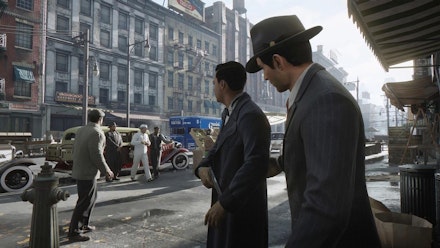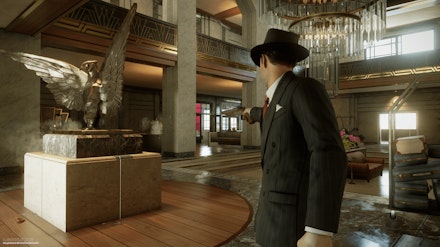After the disappointing remaster of Mafia II back in May, this ground-up remake of the original Mafia game is a bit more like it – although the emphasis is very much on "a bit", as this rebuild crime classic isn't without its own faults.
Originally released in the misty depths of time mortals refer to as 2002, Mafia told the rise and fall of Tommy Angelo, growing from struggling cabbie to esteemed member of the Salieri crime family. That remains the case for the remake, albeit with newly recorded dialogue and performance capture to better place this remake alongside the cinematic gangster movies it's so clearly inspired by.

The core of the game is the single-player narrative, told in flashback by a desperate, harried Tommy a decade or so after the game kicks off in 1930. Early chapters double as tutorial, relaying the game's systems to the player while also cleverly pacing Tommy's induction into the criminal underworld – each step he takes into his new life delivers a new mechanic, from evading cops, to stealing cars, to fisticuffs, to weapons. By the time you're up to speed on the game's systems, Tommy's gunning down rival crooks and unable to wash the blood from his hands.
As a remake, don't expect anything of the depth and quality of Final Fantasy VII Remake though. While this is a visually resplendent world that developer Hangar 13 has created, there isn't as much to sing about in structural overhauls. Mechanically, Definitive Edition hews closest to Mafia III, although a "Classic" difficulty mode aligns more closely to the 2002 version, with harsher limits on ammunition and more alert police responses. In either case, shooting only ever feels fine at best, and melee combat is clunky. The occasional moments where stealth is an option are great though – unfortunately, there aren't enough of them.
As a remake, don't expect anything of the depth and quality of Final Fantasy VII Remake.
Vehicle mechanics are much improved, however — a delight given how much of the game can be spent in cars. There are a host of vehicles to acquire – illicitly, usually – in the game, and the Definitive Edition introduces motorbikes for the first time. Although each will have their own performance specifications, at their best the cars and bikes here are a joy to zoom around in. There's a real pleasure in zipping along country lanes at speed, or swerving through city traffic while evading the cops.
What may frustrate both new and returning players though is the rigid linearity of the game. For as much as Mafia riffs on the likes of The Godfather, this isn't a movie to be consumed passively, yet its habit of simply guiding players from shootout to car heist to shootout again often feels like it would rather be one. That the campaign offers few real opportunities to go off on a tangent is a shame, given the rebuilt setting – the fictional city of Lost Heaven, a glorious metropolis surrounded by lush farmland and beautiful lakes – begs to be explored.

To somewhat make up for this, there's the Free Ride mode, unlocked after completing the first chapter. This lets you explore Lost Heaven at your own pace, allowing you to drive around the vast world or wander on foot. Unfortunately, this highlights another problem – this heaven is empty. Sure, people wander the streets, helping build an atmosphere befitting a major city, but you can't really interact with them. Only a few select buildings can be entered. Fancy driving out to that distant house in the hills that you can see on your map? Go ahead – but don't expect to find anything there, apart from unusual sounds emanating from an inaccessible building.
If you're looking for a tightly told rags-to-riches gangster story set in a stunningly presented world, Mafia: Definitive Edition is worth your time. If you're hoping for more to do in that world, or reason to explore beyond the simple enjoyment of racing around and admiring the scenery, you may be disappointed.
Buy now from Amazon on PS4 noopener noreferrer}__._
